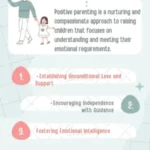Welcome to the great experience of becoming a parent! One of the most wonderful and difficult experiences life has to offer is being a parent. Every parent wants to give their kids a joyful, peaceful environment filled with positivity, love, and understanding. In this post, we’ll look at seven crucial Positive Parenting Tips that can assist you in creating a caring atmosphere that promotes your kids’ development, happiness, and mental health.
The Power of Positive Communication:
The very first positive parenting tips is Positive communication. Effective communication lies at the heart of building strong parent-child relationships. Positive communication entails active listening, empathy, and the use of encouraging words. Taking the time to truly listen to your child’s thoughts and feelings validates their emotions and nuThe very first positive parenting tips isThe very first positive parenting tips isrtures trust. Rather than resorting to criticism or harsh language, focus on constructive feedback and praise their efforts. By fostering open and respectful dialogue, you create a safe space for your child to express themselves, boosting their self-esteem and emotional resilience.

Read also: Yoga Playtime: 5 Sports-Inspired Poses for Kids’ Fitness
Establishing Consistent Boundaries:
Setting clear and consistent boundaries is essential for a happy home. Children thrive when they know what is expected of them and what behavior is acceptable. Establishing rules that are fair and age-appropriate helps children develop a sense of responsibility and self-discipline. Remember, boundaries need not be restrictive; they can be framed positively to encourage positive behavior and choices.
Practicing Positive Discipline:
Positive discipline involves teaching and guiding rather than punishing. While it’s important to deal with disobedience, your child’s crucial life lessons and problem-solving abilities should come first. Physical punishment and humiliation should be avoided since they can harm a child’s mental wellbeing over the long run. Instead, employ time-outs, sensible penalties, or redirection to assist your child understand the consequences of their actions and encourage positive behavior.
Foster a Loving and Affectionate Environment:
Love is the cornerstone of a happy home. Expressing affection through hugs, words of affirmation, and spending quality time together strengthens the parent-child bond. Children who grow up in a loving and nurturing environment are more likely to develop healthy emotional relationships and a positive self-image.
Encourage Independence and Decision-making:
As parents, it can be tempting to shield our children from every challenge they may encounter. However, encouraging independence and giving children the freedom to make age-appropriate decisions encourages self-assurance and independence. Encourage your child to accept obligations, find solutions to problems, and take responsibility for their actions. Giving children direction and support as they forge their own paths will enable them to develop into strong, independent people.
Lead by Example:
Children often mirror the behavior of their parents. To create a happy home, it is vital to model the values and attitudes you wish to instill in your child. Show kindness, patience, and respect in your interactions with others, including your child. Demonstrate healthy ways to manage stress and conflicts, and your child will internalize these positive behaviors.
Embrace Playfulness and Fun:
The final positive parenting tips is playfulness and funs. Amidst the demands of everyday life, don’t forget to embrace playfulness and have fun with your child. Engage in activities that bring joy to both of you, such as playing games, exploring nature, or simply sharing laughter. These moments create cherished memories and strengthen your emotional connection with your child.
Conclusion:
Positivity in parenting is a lifelong endeavor that calls for commitment, tolerance, and love. You may create a compassionate and supportive atmosphere where your child can thrive emotionally, socially, and academically by adopting these seven key positive parenting tips into your parenting style. Consider the distinct needs of each child when designing your parenting approach. Celebrate the minor wins, take lessons from the difficulties, and value the extraordinary relationship you have with your child. Together, you can create a haven of love, happiness, and positivity that will last a lifetime. Happy parenting!




